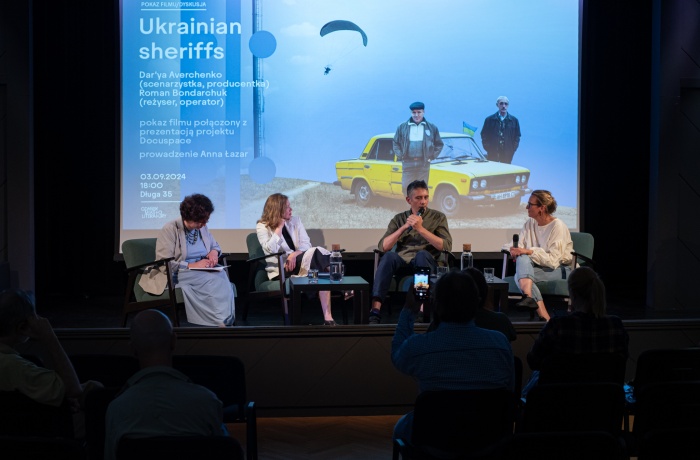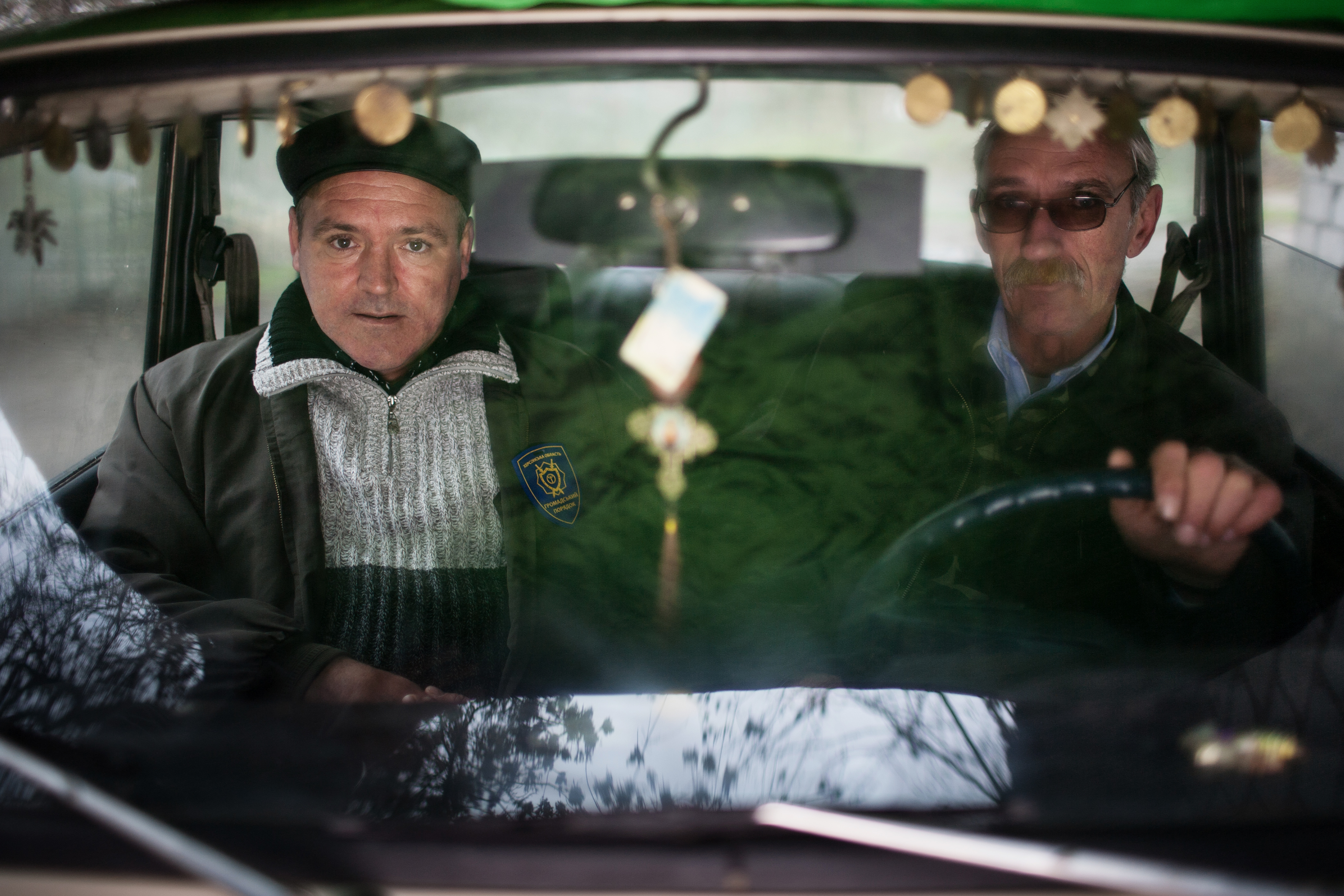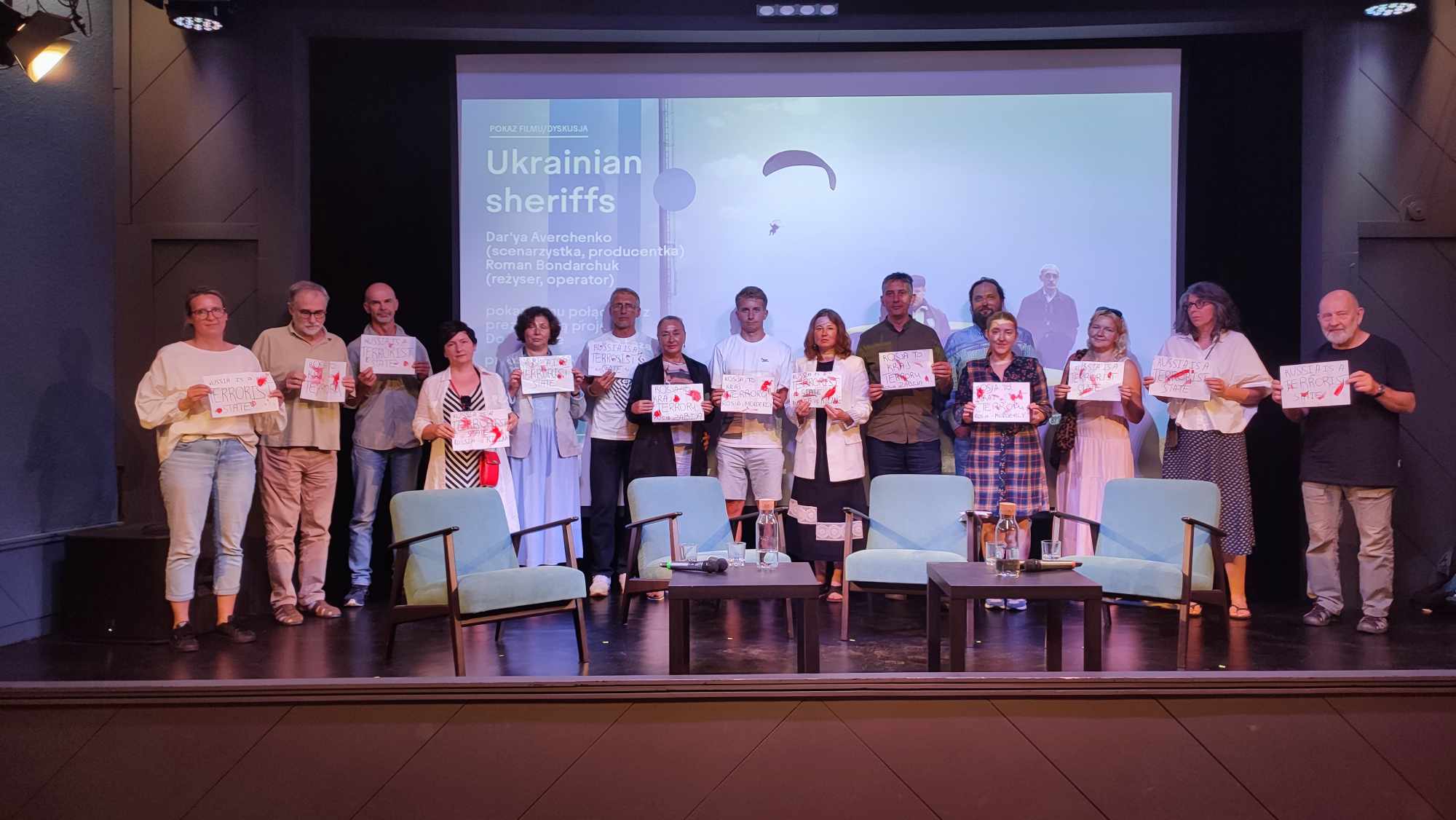
At the beginning of September, Ukrainian filmmakers Darya Averchenko and Roman Bondarchuk were invited to participate in the Polish initiative “Gdańsk: City of Literature”, where they had the opportunity to screen their film Ukrainian Sheriffs, as well as to present the Docudays UA festival and the DOCUSPACE online cinema. Here is Daryaʼs essay about her impressions of the meeting and her thoughts on cultural diplomacy projects.
My routes have not yet brought me to Gdańsk, so the invitation from Gdańsk: City of Literature was a great and pleasant discovery for me. I had no idea that this is the new Amsterdam, only the people are much friendlier and the coffee is much tastier and cheaper. Itʼs also only a two-hour drive from Gdańsk to the border with the Kaliningrad region, which explains the crowds of Russians walking the local streets, loudly commenting on their shopping achievements. Because of this proximity, the initiative of Polish activists to invite Ukrainian artists and communicate with them directly is extremely important.
The screening of our film Ukrainian Sheriffs and the conversation with the director Roman Bondarchuk gathered several dozen viewers, both Poles and Ukrainians.
I hadnʼt realised before how important it is for our citizens to keep in touch with home. It is a contact that helps them imagine their return, even if their cities are currently under occupation.
Ukrainian Sheriffs is our favourite documentary. To make this film, Roman, Borys Peter, the sound engineer, and I moved to the village of Stara Zburyivka, Kherson region, for several years and lived in my parentsʼ country house.
We were inspired by the village community. The way its residents gathered in the community centre whenever an important decision had to be made. They discussed it together and voted openly — it was direct democracy in action. The village head Viktor Maruniak, a historian by training, explained that this tradition has not been interrupted. The residents of Stara Zburyivka were once sailors and fishermen, and during the Soviet era, they never formed a collective farm. Thatʼs why their freedom-loving spirit hasnʼt disappeared.
The police rarely came to the village, mostly when they were informed about the dead. As to the thefts or domestic quarrels, there was no response at all: the way is long (not enough petrol), and itʼs hard not to get lost — the village is scattered across sand dunes, there are no maps or number plates on the houses. You need to know all the residents by sight. Thatʼs how the idea came up to appoint local residents Viktor Kryvoborodko and Volodymyr Rudkovsky as village sheriffs.
A still from the film Ukrainian Sheriffs
Viktor and Volodymyr became our guides to the life of Stara Zburyivka, where many dramas took place every day: someone broke a window at night and stole some drake from the barn, or a labourer broke the lock of a farmer, his employer. Or simply someone wandering around the village with an axe, scaring passers-by.
However, in the winter of 2013, we witnessed an attempted political coup. A pro-Russian separatist began to gather his community in the village, promising to cancel all taxes and withdraw his “subjects” from the jurisdiction of the Ukrainian State to make them extra-state “sovereigns”. He began issuing passports and even driving licences to his “sovereigns”. He managed to gather the village for a meeting where he wanted to establish his authority. Fortunately, the majority of active residents sent him to the next elections to compete fairly with the current head.
Since then, we have not been filming a comic story about the search for stolen eurodrakes, but have been documenting a microcosm of an entire country, where brave and freedom-loving people live, but at the same time pro-Russian separatists are active. In many other villages and towns in eastern Ukraine, such separatists managed to split communities, spread fables about Russiaʼs greatness and common happy history, and pave the way for military annexation.
Ten years ago, the main narrative in the Ukrainian media about the South was that it was Russian-speaking and depressed. Our research during the filming proved that Ukrainian is spoken in the South, people are far from depressed, and they are in no way waiting for Russia. On the contrary, they go to defend Ukraine when they receive calls. There was something wrong with the narratives.
Today, the village is under Russian occupation — all in defensive structures, filled with military personnel who treat the locals like serfs, taking away their property and demanding permits to move between checkpoints. The Russians appointed a relative of the separatist who appeared in our film to run the village. Her job now consists mainly of appearing in Russian propaganda videos about raising the tricolour over the village council or treating the elderly of the village to porridge from the field kitchen.
But even in these conditions, there are brave people who are fighting guerrilla warfare, passing information about the enemyʼs location to the Ukrainian military or even organising sabotage.
Our sheriffs are at the frontline, and Viktor Marunyak miraculously managed to escape after being tortured by Russian special services. Their houses are occupied by the occupiers, as is my parentsʼ house.

The action “Russia is a terrorist state” after the screening of the film
At the screening in Gdańsk, we met a girl from Stara Zburyivka whose parents are still there. She was crying when she told us how they are living now. But we all agreed to return at the earliest opportunity to hug our own, rebuild their homes and shoot the second episode of Ukrainian Sheriffs.
And another thought kept coming to me as I walked around the building of “Gdańsk: City of Literature.” I thought that the time would come when we would open a similar centre of Ukrainian culture in the liberated Yalta. There will also be a bookshop with Ukrainian books, and we will give the walls to exhibitions of contemporary Ukrainian artists and photographers. There will be a room for meetings and exchange of ideas among active local residents. There will be screenings, discussions over coffee, and the smell of the Black Sea from the waterfront. I believe with all my heart that this will happen.
The author of the text: Darya Averchenko
The trip was made at the invitation of “Gdańsk: City of Literature” and with the support of the Docudays UA festival
Photos provided by the “Gdańsk: City of Literature” initiative